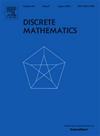使用势能法对稀疏图进行 2-Distance (Δ + 1) 着色
IF 0.7
3区 数学
Q2 MATHEMATICS
引用次数: 0
摘要
图的 2-distance k-coloring 是顶点的适当 k-coloring ,其中顶点的距离最多为 2,不能共享相同的颜色。我们证明了最大平均度数小于 187 且最大度数Δ≥7 的图的 2-distance (Δ+1)-coloring 的存在。作为推论,每个周长至少为 9 且 Δ≥7 的平面图都有一个 2-distance (Δ+1)-coloring 。与经典的 2-距离着色方法相比,证明使用了势法来减少新的配置。本文章由计算机程序翻译,如有差异,请以英文原文为准。
2-Distance (Δ + 1)-coloring of sparse graphs using the potential method
A 2-distance k-coloring of a graph is a proper k-coloring of the vertices where vertices at distance at most 2 cannot share the same color. We prove the existence of a 2-distance ()-coloring for graphs with maximum average degree less than and maximum degree . As a corollary, every planar graph with girth at least 9 and admits a 2-distance -coloring. The proof uses the potential method to reduce new configurations compared to classic approaches on 2-distance coloring.
求助全文
通过发布文献求助,成功后即可免费获取论文全文。
去求助
来源期刊

Discrete Mathematics
数学-数学
CiteScore
1.50
自引率
12.50%
发文量
424
审稿时长
6 months
期刊介绍:
Discrete Mathematics provides a common forum for significant research in many areas of discrete mathematics and combinatorics. Among the fields covered by Discrete Mathematics are graph and hypergraph theory, enumeration, coding theory, block designs, the combinatorics of partially ordered sets, extremal set theory, matroid theory, algebraic combinatorics, discrete geometry, matrices, and discrete probability theory.
Items in the journal include research articles (Contributions or Notes, depending on length) and survey/expository articles (Perspectives). Efforts are made to process the submission of Notes (short articles) quickly. The Perspectives section features expository articles accessible to a broad audience that cast new light or present unifying points of view on well-known or insufficiently-known topics.
 求助内容:
求助内容: 应助结果提醒方式:
应助结果提醒方式:


